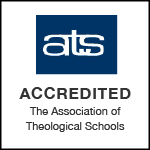$1.25 Million Grant to Help Establish UDTS Initiative to Revitalize Small Churches
Dec 11, 2023 | UDTS
DUBUQUE, Iowa - The University of Dubuque Theological Seminary has received a $1.25 million grant from Lilly Endowment Inc. to help establish Plentiful Gifts: Nourishing Members for the Flourishing of Small Member Congregations. Through this new initiative, UDTS will partner with several judicatories to shepherd cohorts of small churches in seasons of transitions, without full-time pastors, to equip members to carry on being church through vital congregational practices.
"Mainline churches have been trending toward smaller memberships and budgets," said Rev. Beth McCaw, DMin, director of the new initiative and associate professor of ministry at UDTS. "At the same time, a wave of clergy has retired, there are many more open pulpits than clergy available, and the pool of current theological students are divided among increasingly varied potential ministry contexts. It can be tempting to conclude that this is a portrait of church decline. What we are discovering, however, is that it is a moment of shifting to fresh forms of church represented among ordinary saints, responding to the hopes and needs of their local communities."
Plentiful Gifts is being funded through Lilly Endowment's Thriving Congregations Initiative. The aim of the initiative is to encourage the flourishing of congregations by helping them deepen their relationships with God, enhance their connections with each other, and contribute to the vitality of their communities and the world.
"For a generation, UDTS has been leaning forward into a changing landscape with creative, hopeful, and flexible forms of Christian leadership training," McCaw said. "Thriving Congregations initiates a new chapter in UDTS joining the church in fresh approaches to service."
Mark Ward, PhD, vice president for academic affairs and dean of the faculty, added, "We are grateful for the Lilly Endowment's commitment to the church and are honored to contribute our efforts to build flourishing local congregations."
Plentiful Gifts will launch in 2024 with six judicatory partners. Each will identify clusters of four to seven churches seeking to join a two-year Plentiful Gifts program. The churches will then reconnect with their neighbors, take stock of the gifts represented among congregational members, and identify four areas of practice for equipping from the areas of preaching, worship, care, service, formation, governance, and communication. In fall 2024, the first three clusters of congregations will begin mission discernment, and then engage in the programs of nurture identified as most essential for their thriving. In fall 2026, the second three clusters of congregations will begin their mission studies and programs of nurture.
The inaugural partners for Plentiful Gifts include the Presbytery of John Knox (Presbyterian Church USA), including portions of Iowa, Wisconsin, and Minnesota; the Presbytery of Plains and Peaks, including portions of Nebraska and Colorado; and the National Association of Congregational Christian Churches.
"The Plentiful Gifts proposal recognizes that in small churches there are innumerable practical and spiritual gifts," McCaw said. "Through fellowship, mentoring, and strategic nurture of Christian practices, we will be supporting those faith communities in revitalizing their gifts as they worship and serve their neighborhoods afresh. It replaces a congregation's posture of falling back into a reduced form of staffing with a posture of leaning forward into a distributed form of ministry. Congregations freed from dependence upon past leadership patterns become open to possibilities such as broad lay leadership, or teaming with commissioned pastors, bi-vocational leaders, circuit preachers, or ecumenical neighbors."
UDTS is one of 105 organizations that has received grants through a competitive round of the Thriving Congregations Initiative. Reflecting a wide variety of Christian traditions, the organizations represent mainline Protestant, evangelical, Catholic, Orthodox, peace church, and Pentecostal faith communities.
"Congregations play an essential role in deepening the faith of individuals and contributing to the vitality of communities," said Christopher L. Coble, Lilly Endowment's vice president for religion. "We hope that these programs will nurture the vibrancy and spark the creativity of congregations, helping them imagine new ways to share God's love in their communities and across the globe."
About Lilly Endowment Inc.
Lilly Endowment Inc. is a private foundation created in 1937 by J.K. Lilly Sr. and his sons Eli and J.K. Jr. through gifts of stock in their pharmaceutical business, Eli Lilly and Company. While those gifts remain the financial bedrock of the Endowment, it is a separate entity from the company, with a distinct governing board, staff, and location. In keeping with the founders' wishes, the Endowment supports the causes of community development, education, and religion and maintains a special commitment to its hometown, Indianapolis, and home state, Indiana. A principal aim of the Endowment's religion grantmaking is to deepen and enrich the lives of Christians in the United States, primarily by seeking out and supporting efforts that enhance the vitality of congregations and strengthen the pastoral and lay leadership of Christian communities. The Endowment also seeks to improve public understanding of diverse religious traditions by supporting fair and accurate portrayals of the role religion plays in the United States and across the globe.





